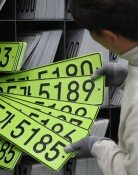Why does Korea lag behind Japan in Nobel Prize winning?
Why does Korea lag behind Japan in Nobel Prize winning?
Posted October. 05, 2016 07:35,
Updated October. 05, 2016 07:56
Tokyo Institute of Technology Professor Yoshinori Ohsumi was awarded the Nobel Prize in Physiology or Medicine on Monday, enabling Japan to win a Nobel Prize for the third consecutive year. He has started research on how cells recycle their content, a process known as autophagy, since the mid-1970s, and this research is now broadly used in the development of various cure treatments for aging, such as Parkinson's and Alzheimer's diseases. Japanese Nobel Prize winners now number 25, ranking second only next to the U.S. (22 winners) in natural science area since 2001.
The world is praising the prowess of Japan's science and technology capabilities, which casts a cloud on Korea. The Korean government and the science sector, which boast themselves for spending the world's biggest amount in R&D, should be embarrassed. Scientists are collectively responding. On Sept. 26, 40 prominent Korean scientists filed a collective petition demanding for reforms, saying that R&D focuses on short-term performance and is mostly ordered by the government. Also in March, representatives at Korea's top five science and engineering universities urged improvements in the government's R&D support assessments focused on short-term performances and volume.
Professor Ohsumi said he hopes to contribute to making a system for younger people engaged in basic research. Novel Prize winners are normally awarded the prize in their 60s after the thesis they wrote in their 30s are quoted for decades. The Japanese government announced that it would spend 26 trillion won (23.46 billion dollars), or 1 percent of the country's GDP, in supporting younger researchers for five years starting this year. The U.S. and U.K. also concentrate R&D spending on supporting young scientists with bold ideas and enthusiasm.
In Korea, the number of researchers aged 40 and below account for 21 percent of all researchers, but research expenses are at just 7 percent of the total. Research project assessments are also made on relationships based on schools and regionalism, and it is difficult to produce substantial outcome in 10-year, long-term projects due to requests for technology transfer and commercialization. As Nature magazine pointed out, labs in Korea are mired in hierarchy making difficult discussions among researchers, while there is a culture of researchers lining up behind professors and experts to gain preferential treatment. Korea shows impatience when the Nobel Prize season approaches and envies other countries' winners. However, unless there is a revolutionary reform in how R&D is supported, there will be no improvement.
Professor Ohsumi said he enjoys pioneering areas nobody tries, as exemplified by his research on a mutant yeast nobody has paid attention. He advised younger people that science is about challenging regardless of success. He means that sticking with one thing is important not swayed by trends, which is something Korean scientists should bear in mind.
허문명논설위원 angelhuh@donga.com
Headline News
- N. Korea launches cyberattacks on S. Korea's defense companies
- Major university hospital professors consider a day off each week
- Italy suffers from fiscal deficits from ‘Super Bonus’ scheme
- Inter Milan secures 20th Serie A title, surpassing AC Milan
- Ruling and opposition prioritize spending amid tax revenue shortfalls







